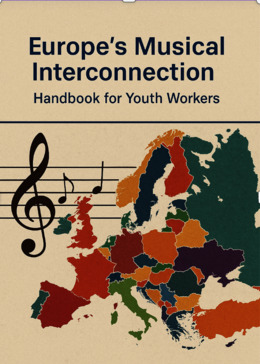Toolbox — For Training and Youth Work
All new tools in your inbox: Be the first to know about new tools for learning with our e-mail notifications.
Exercise, Energiser, Presentation, Manual, Ice-breaker, Group Building Activity
MUSIC IN YOUTHWORK- WORKING FOR INCLUSION -HANDBOOK FOR YOUTH WORKERS
A practical Erasmus+ handbook for youth workers on using music to foster inclusion, creativity, and intercultural dialogue through non-formal education. Includes workshop methods, tools, digital tips, and resources for collaborative learning.
Aims of the tool
To equip youth workers with practical, music-based methods and non-formal education approaches that promote inclusion, creativity, emotional expression, and intercultural dialogue among young people, enhancing participation and community cohesion.
Description of the tool
The Handbook for Youth Workers – How to Use Music in Youth Work is a practical guide developed within the Erasmus+ project Europe’s Musical Interconnection (EUMI 2).
It provides youth workers and educators with concrete, adaptable methods to use music as a tool for learning, inclusion, and intercultural dialogue.
Grounded in non-formal education principles, the handbook encourages learning by doing, creativity, and collaboration. It offers ready-to-use workshop plans, facilitation tips, digital tools, and reflection templates to help youth workers design engaging activities that foster connection, self-expression, and empowerment among young people.
Learning Outcomes:
By using this tool, participants will:
Develop creative facilitation skills using music and rhythm as educational resources.
Strengthen communication, collaboration, and empathy through group music activities.
Enhance digital literacy via podcasting, sound recording, and media creation.
Gain intercultural competence, understanding diversity through shared musical expression.
Build emotional awareness and self-confidence in both facilitators and young participants.
Learn to design and evaluate non-formal learning experiences adaptable to different contexts.
Available downloads:
Disclaimer
SALTO cannot be held responsible for the inappropriate use of these training tools. Always adapt training tools to your aims, context, target group and to your own skills! These tools have been used in a variety of formats and situations. Please notify SALTO should you know about the origin of or copyright on this tool.
Tool overview

http://toolbox.salto-youth.net/5187
This tool is for
Youth workers, educators, trainers, and facilitators working in non-formal education settings with young people aged 13–30, including those with fewer opportunities, from diverse cultural backgrounds, or at risk of social exclusion. It is also suitable for organizations and NGOs seeking to integrate creative and music-based methodologies into their youth work and community projects.
and addresses
Social Inclusion, Group Dynamics, Intercultural Learning, Youth Participation
It is recommended for use in:
Youth Exchanges
Training and Networking
Materials needed:
Simple percussion instruments (e.g., tambourines, maracas, drums) or everyday objects for rhythm-making (chairs, bottles, pencils).
Computer or tablet with internet access.
Microphone and basic audio recording/editing software (e.g., Audacity, Soundtrap, BandLab).
Speakers or sound system for music playback.
Stationery (paper, pens, markers) for reflection and creative writing.
Optional: digital collaboration tools (e.g., Miro, Padlet, Jamboard) and rhythm/music apps (e.g., Groove Pizza, Incredibox, Chrome Music Lab).
Duration:
The tool is flexible and can be adapted to different contexts:
Short workshops: 20–60 minutes (e.g., rhythm games, body percussion, or icebreakers).
Medium sessions: 1–2 hours (e.g., songwriting, emotional expression through music).
Extended programmes: 1 day to 4 weeks (e.g., podcast creation, intercultural collaboration projects).
Each activity follows a non-formal learning process:
Experience – engaging in a music-based activity.
Reflection – discussing emotions, teamwork, and inclusion.
Conceptualization – connecting learning to youth work practice.
Application – adapting and replicating methods locally.
Behind the tool
The tool was created by
YOUMORE APS
in the context of
YOUTH WORKERS
The tool has been experimented in
EUMI PART 2 TRAINING COURSE
The tool was published to the Toolbox by
Sona Arevshatyan (on 4 November 2025)
and last modified
2 November 2025
Comments
No comments have been posted yet.
If you want to comment on this tool, you need to be signed in with your MySALTO account. Sign in now